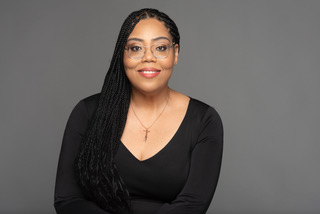A Personal Story Honoring National Kidney Month: Patient Q&A With Quin Taylor

Quin Taylor was a sophomore enjoying her undergraduate experience when suddenly her body became unrecognizable. She soon received a phone call that would be the most defining moment of her life: her kidneys were failing. Dialysis had always been a part of her life, her father managed end-stage kidney failure, but she went from being a support person to a patient in a short conversation.
She decided that she was going to have dialysis, it wasn’t going to have her. She has navigated her way through getting listed for a transplant to receiving a life-saving kidney transplant and thriving through it all. She found her passion and purpose during this time, patient advocacy. She lends her voice to speak for patients who still haven’t found theirs through her company, Tayloring Gratitude, that helps patients manage medical overwhelm.
In honor of National Kidney Month we spoke with Quin to discuss how her diagnosis has impacted her life, and what advice she would give to other kidney patients starting out on their treatment journey.
If there was something you wish you knew at the start of your story as a kidney disease patient, what would it be?
That this will be a life-long relationship. There is no cure.
What is the biggest impact your diagnosis has had on your life?
Learning to write the narrative about the type of life I want to live, not the life others tell me I will have.
What advice would you give to a kidney disease patient starting out on their treatment journey?
It gets better. It’s really hard to see and feel that many times during the journey, but it does get better.
What are some of the questions that patients, caregivers or loved ones of a patient with kidney disease should ask their doctor after a diagnosis?
Patients and caregivers should ask about resources, services and organizations that can help them improve their quality of life as they adjust to living with a chronic illness. Also, they should ask about support systems that can be a place of education, empowerment and a safe place.
How have you found support through your diagnosis and treatment journey, and how would you recommend others find support?
I’ve found support in the most unlikely places. Facebook friends, strangers who I share my story with. There was a lady I was on an airport shuttle with who offered to donate her kidney to me. Sometimes we invite amazing people with compassion and empathy into this difficult journey who restore our hope just be sharing what we’re going through.
For more information on chronic and rare kidney disease, see resources from NephCure Kidney International.
